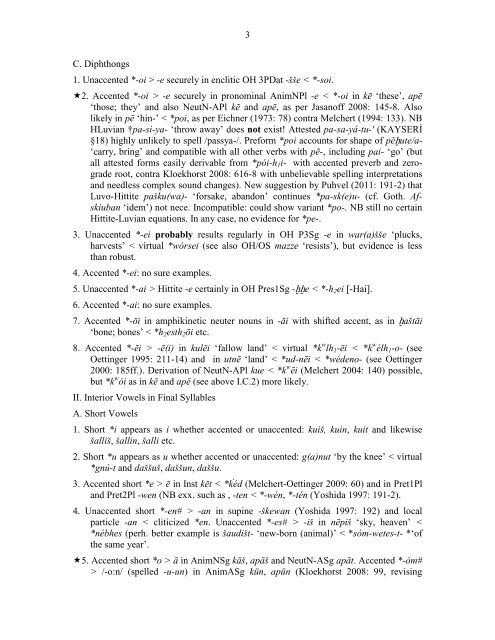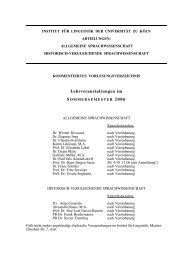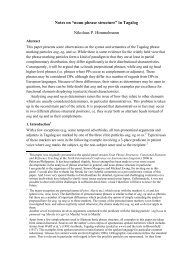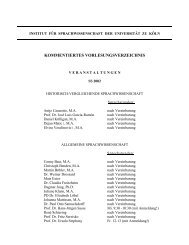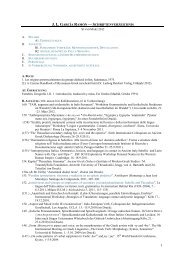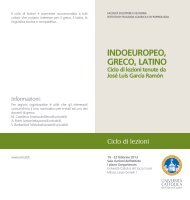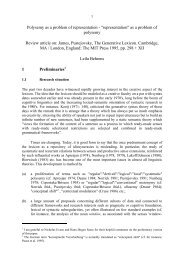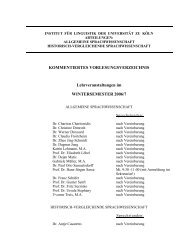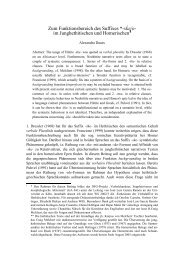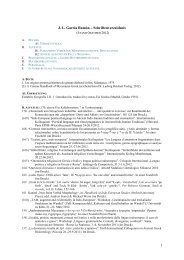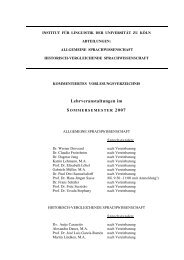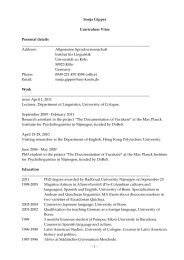Topics in Anatolian Historical Grammar Prof. Dr. H. Craig Melchert
Topics in Anatolian Historical Grammar Prof. Dr. H. Craig Melchert
Topics in Anatolian Historical Grammar Prof. Dr. H. Craig Melchert
Create successful ePaper yourself
Turn your PDF publications into a flip-book with our unique Google optimized e-Paper software.
3<br />
C. Diphthongs<br />
1. Unaccented *-oi > -e securely <strong>in</strong> enclitic OH 3PDat -šše < *-soi.<br />
2. Accented *-oi > -e securely <strong>in</strong> pronom<strong>in</strong>al AnimNPl -e < *-oi <strong>in</strong> kē ‘these’, apē<br />
‘those; they’ and also NeutN-APl kē and apē, as per Jasanoff 2008: 145-8. Also<br />
likely <strong>in</strong> pē ‘h<strong>in</strong>-’ < *poi, as per Eichner (1973: 78) contra <strong>Melchert</strong> (1994: 133). NB<br />
HLuvian †pa-si-ya- ‘throw away’ does not exist! Attested pa-sa-yá-tu-' (KAYSERİ<br />
§18) highly unlikely to spell /passya-/. Preform *poi accounts for shape of pēḫute/a-<br />
‘carry, br<strong>in</strong>g’ and compatible with all other verbs with pē-, <strong>in</strong>clud<strong>in</strong>g pai- ‘go’ (but<br />
all attested forms easily derivable from *pói-h 1 i- with accented preverb and zerograde<br />
root, contra Kloekhorst 2008: 616-8 with unbelievable spell<strong>in</strong>g <strong>in</strong>terpretations<br />
and needless complex sound changes). New suggestion by Puhvel (2011: 191-2) that<br />
Luvo-Hittite pašku(wa)- ‘forsake, abandon’ cont<strong>in</strong>ues *pa-sk(e)u- (cf. Goth. Afskiuban<br />
‘idem’) not nece. Incompatible: could show variant *po-. NB still no certa<strong>in</strong><br />
Hittite-Luvian equations. In any case, no evidence for *pe-.<br />
3. Unaccented *-ei probably results regularly <strong>in</strong> OH P3Sg -e <strong>in</strong> war(a)šše ‘plucks,<br />
harvests’ < virtual *wórsei (see also OH/OS mazze ‘resists’), but evidence is less<br />
than robust.<br />
4. Accented *-ei: no sure examples.<br />
5. Unaccented *-ai > Hittite -e certa<strong>in</strong>ly <strong>in</strong> OH Pres1Sg -ḫḫe < *-h 2 ei [-Hai].<br />
6. Accented *-ai: no sure examples.<br />
7. Accented *-ōi <strong>in</strong> amphik<strong>in</strong>etic neuter nouns <strong>in</strong> -āi with shifted accent, as <strong>in</strong> ḫaštāi<br />
‘bone; bones’ < *h 2 esth 2 ōi etc.<br />
8. Accented *-ēi > -ē(i) <strong>in</strong> kulēi ‘fallow land’ < virtual *k w lh 1 -ēi < *k w élh 1 -o- (see<br />
Oett<strong>in</strong>ger 1995: 211-14) and <strong>in</strong> utnē ‘land’ < *ud-nēi < *wédeno- (see Oett<strong>in</strong>ger<br />
2000: 185ff.). Derivation of NeutN-APl kue < *k w ēi (<strong>Melchert</strong> 2004: 140) possible,<br />
but *k w ói as <strong>in</strong> kē and apē (see above I.C.2) more likely.<br />
II. Interior Vowels <strong>in</strong> F<strong>in</strong>al Syllables<br />
A. Short Vowels<br />
1. Short *i appears as i whether accented or unaccented: kuiš, ku<strong>in</strong>, kuit and likewise<br />
šalliš, šall<strong>in</strong>, šalli etc.<br />
2. Short *u appears as u whether accented or unaccented: g(a)nut ‘by the knee’ < virtual<br />
*gnú-t and daššuš, daššun, daššu.<br />
3. Accented short *e > ē <strong>in</strong> Inst kēt < *kéd (<strong>Melchert</strong>-Oett<strong>in</strong>ger 2009: 60) and <strong>in</strong> Pret1Pl<br />
and Pret2Pl -wen (NB exx. such as , -ten < *-wén, *-tén (Yoshida 1997: 191-2).<br />
4. Unaccented short *-en# > -an <strong>in</strong> sup<strong>in</strong>e -škewan (Yoshida 1997: 192) and local<br />
particle -an < cliticized *en. Unaccented *-es# > -iš <strong>in</strong> nēpiš ‘sky, heaven’ <<br />
*nébhes (perh. better example is šaudišt- ‘new-born (animal)’ < *sóm-wetes-t- *‘of<br />
the same year’.<br />
5. Accented short *o > ā <strong>in</strong> AnimNSg kāš, apāš and NeutN-ASg apāt. Accented *-óm#<br />
> /-o:n/ (spelled -u-un) <strong>in</strong> AnimASg kūn, apūn (Kloekhorst 2008: 99, revis<strong>in</strong>g


